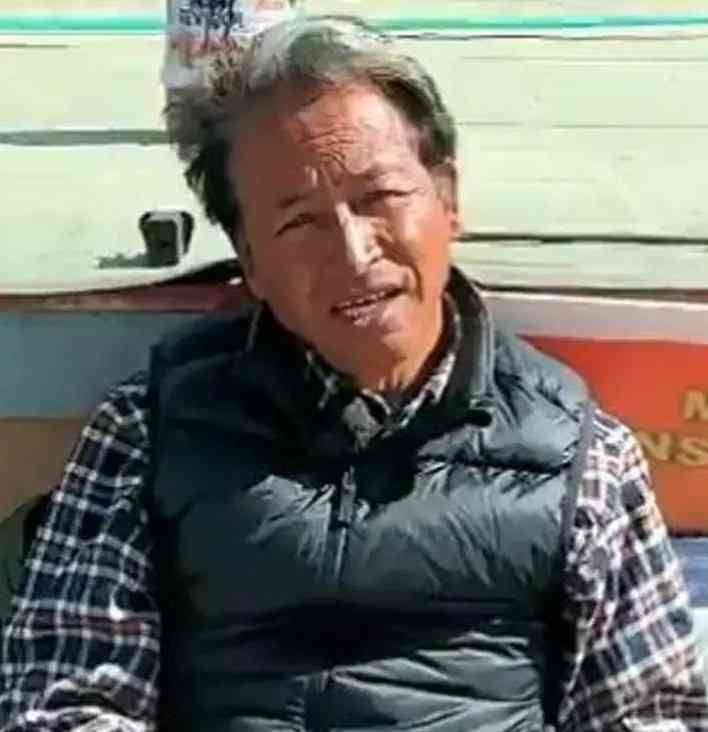Leh, September 27 — Ladakh police have launched an investigation into alleged foreign funding and links with Pakistan of prominent educationist and activist Sonam Wangchuk, who was detained under the National Security Act (NSA) following violent protests earlier this week.
The unrest, centered around demands for statehood and inclusion of Ladakh under the Sixth Schedule of the Constitution, left four people dead and dozens injured.
Union Territory police chief SD Singh Jamwal said on Saturday that authorities were closely scrutinising Wangchuk’s financial dealings for suspected violations of the Foreign Contribution Regulation Act (FCRA).
Speaking at a press conference in Leh, the Director General of Police said that the probe also covered Wangchuk’s alleged past interactions with Pakistan.
Allegations of Pakistan Links
According to DGP Jamwal, investigators had recently apprehended a suspected Pakistani intelligence operative who was allegedly monitoring the activist’s activities in Ladakh.
“We arrested a Pakistan PIO (intelligence operative) in the recent past who was reporting on him,” Jamwal told reporters, speaking in Hindi.
The police chief further questioned Wangchuk’s earlier participation in a media event in Pakistan, stating: “He had attended a Dawn event in Pakistan. So, there is a big question mark on him.”
Jamwal also suggested that Wangchuk’s activism had at times carried a subversive tone, recalling his past references to movements such as the Arab Spring, Nepal, and Bangladesh. “He has a history of instigating,” the DGP remarked.
Investigation Into Funding
The police confirmed that Wangchuk’s organisation is already facing scrutiny for alleged irregularities in foreign contributions. Earlier this week, the Ministry of Home Affairs cancelled the FCRA licence of the Students’ Educational and Cultural Movement of Ladakh (SECMOL), founded by Wangchuk, citing discrepancies in its financial records and the receipt of overseas funds “against national interest.”
Jamwal said the financial probe into Wangchuk’s alleged violations was continuing: “The investigation into his funding is going on for FCRA violation.”
Protests Turn Violent
The 58-year-old activist was detained on Friday after protests demanding Ladakh’s statehood and Sixth Schedule protections spiralled out of control on September 24. Demonstrators clashed with security forces in Leh, resulting in the death of four people and injuries to civilians, police personnel and paramilitary staff.
Wangchuk, who had been on a hunger strike, was leading the demonstrations under the banner of various local groups pressing for constitutional safeguards for Ladakh’s environment, land and culture. The protests, which began peacefully, escalated into violence midweek.
DGP Jamwal described the events as “unfortunate,” stating: “This involved some so-called environmental activists; there is a question mark on their credibility as well.” He alleged that certain activists, including Wangchuk, attempted to hijack the platform of the movement.
“They tried to derail the talks with the Centre. The prime name here is Sonam Wangchuk,” ANI quoted him as saying.
Detention Under NSA
Wangchuk’s detention under the stringent National Security Act has drawn sharp political reactions. The law allows authorities to detain individuals for up to a year without formal charges if they are deemed a threat to national security or public order.
Opposition parties have strongly criticised the move. Senior Congress leader and Rajya Sabha MP Digvijay Singh said on Saturday that invoking the NSA against a Gandhian activist was unjustified.
“Sonam Wangchuk has given an identity to Ladakh, its culture and its heritage. He served in every possible way, through education and through healthcare,” Singh said, according to ANI.
The Congress leader recalled that Prime Minister Narendra Modi had praised Wangchuk until 2019 and noted that the Centre had once promised Ladakh both statehood and inclusion in the Sixth Schedule.
“The government promised statehood as well as the 6th schedule after the elections, but they did not keep their promise,” Singh remarked.
Rising Tensions in Ladakh
Wangchuk, known internationally for his contributions to education reform and environmental activism, has been a vocal advocate for Ladakh’s autonomy.
Following the abrogation of Article 370 in 2019 and the bifurcation of Jammu and Kashmir, Ladakh was carved out as a Union Territory without legislature. Since then, local groups have been demanding constitutional safeguards to protect the region’s fragile ecology and unique cultural identity.
The Sixth Schedule, currently applicable to several northeastern states, provides special autonomy to tribal communities in matters relating to land, natural resources, and cultural practices. Ladakh’s representatives argue that such provisions are essential to prevent large-scale exploitation and ensure self-governance.
However, tensions have grown between activists and the administration amid what locals describe as unfulfilled promises by the central government.
While the Centre held several rounds of talks with Ladakhi leaders, including representatives of the Leh Apex Body and the Kargil Democratic Alliance, no concrete assurance has yet been given on the Sixth Schedule demand.
Polarised Reactions
The allegations against Wangchuk have divided opinion across political and social circles. Supporters describe him as a non-violent reformer inspired by Gandhian philosophy, pointing to his pioneering educational initiatives such as the SECMOL campus and sustainable innovations in the region. Critics, however, argue that his recent activism has taken on a political tone, leading to confrontation with authorities.
The police claim that provocative speeches by activists contributed to the escalation of protests this week. “Provocative speeches were made by so-called environmental activists in the lead-up to the protests,” DGP Jamwal alleged.
Looking Ahead
The developments mark a significant escalation in the Ladakh agitation, with both the Centre and the UT administration facing criticism for the handling of protests.
The detention of a widely respected activist under the NSA, coupled with allegations of foreign links, has intensified the debate over dissent, security, and democracy in the strategically sensitive Himalayan region.
With investigations ongoing into alleged funding irregularities and political leaders pressing for his release, Sonam Wangchuk’s case is expected to remain at the forefront of Ladakh’s political discourse in the coming weeks.








